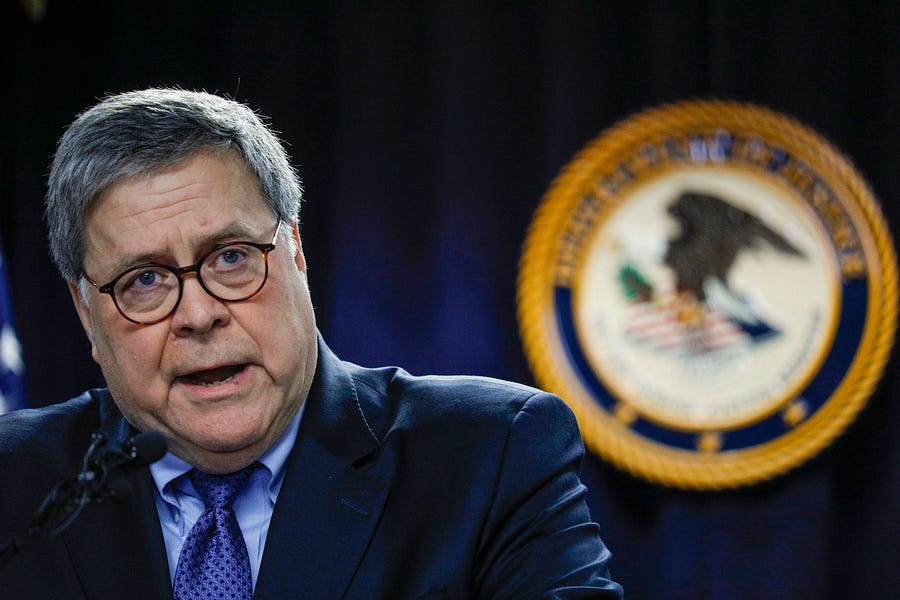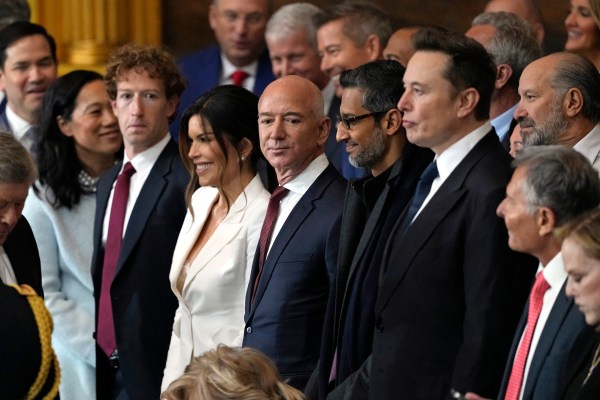On Sunday, more than 1,100 former federal prosecutors and Justice Department officials called on Attorney General William Barr to step down over his handling of the Roger Stone matter. The letter is an overreaction to the substance of what happened. But it highlights the serious dangers of President Donald Trump’s attacks and complaints about the Justice Department; and it underscores how Barr himself, through acquiescence and action, has contributed to the perceived politicization of law enforcement in the Justice Department.
* * *
Here is what the controversy is about. In November 2019, while Barr was attorney general, the U.S. Attorney’s Office for the District of Columbia prosecuted and convicted Roger Stone for obstruction of justice, false statements, and witness tampering. On February 10, 2020, prosecutors recommended that Stone receive a seven- to nine-year sentence. Early the next morning, February 11, at 1:48 a.m., Trump tweeted:
Later that morning, a senior Justice Department official said that the department was “shocked” by the sentencing recommendation and would “clarify its position in court later today.” Trump spent the day tweeting criticisms of the Stone prosecutors and the judge presiding over the Stone case, Amy Berman Jackson. That afternoon, prosecutors on the case quit, and one resigned from the department. In the late afternoon, the department announced its new position on sentencing, arguing that “a sentence of incarceration far less” than the original recommendation would be “reasonable under the circumstances.” And then the next morning, February 12, Trump tweeted:
The department’s apparent cave in a case affecting Trump’s political interests, followed by the resignations and the president’s congratulations, led Barr to arrange an interview with ABC’s Pierre Thomas on February 13 to address the matter. Barr insisted that the decision about the Stone sentencing recommendation was based on legitimate factors before and independent of Trump’s tweets. He then rebuked the president for his tweets and commentary, which Barr claimed were “disruptive,” and “undercut” his authority. They “make it impossible for me to do my job and to assure the courts and the prosecutors in the department that we’re doing our work with integrity,” Barr added, since they make decisions that he took on the merits seem like they were politically influenced. Barr added the president’s attacks on Justice Department officials were “unfair” and made it “difficult to be a leader” of the department, and that his attack on the judge in the case was “not helpful or productive at all.”
* * *
The letter from former officials claims that Barr’s actions in the Stone matter pose “a grave threat to the fair administration of justice.” This is an exaggeration. Barr acted within his authority to change the sentencing recommendation from a prescribed sentence to merely no formal recommendation at all, and the judge in the case, Amy Berman Jackson, has complete discretion to do whatever she wants. It may well be that Jackson will impose a sentence of less than seven to nine years; even the career prosecutors noted factors cutting against their recommendation. But the actions by Trump and Barr put her in an exceedingly awkward position that is hardly helpful to Stone. The main point is that the matter remains in the judge’s hands and the fair administration of justice will not be impacted.
And yet Barr’s actions and non-actions since his confirmation as attorney general a year ago have increasingly contributed to the perception that the Justice Department is making politicized decisions.
Trump has been criticizing DoJ personnel and judges throughout Barr’s tenure. Through Twitter alone, Trump complained in political terms about judges who ruled against his administration on immigration and census issues. He grumbled about the department’s supposed double standards in its failure to go investigate former government officials, about corruption and bias in the Obama Justice Department on the same score, and about Barr not prosecuting former FBI Director James Comey. And he implied that Barr should investigate “Hillary, the DNC and Dirty Cops,” the latter being a reference to former DoJ officials.
In the face of all this, Barr remained silent until last week other than to say he doesn’t read tweets. Worse, he has implied that there is nothing wrong with the president’s behavior. In an interview last May 31, he stated that he had seen “no evidence” that President Trump had been “shredding our institutions.” And in his Federalist Society speech on November 15, Barr disagreed that the president was “‘shredding’ constitutional norms and waging a war on the rule of law.” Barr has also encouraged the president’s attacks by going along with his characterization of electronic and human surveillance on Trump campaign officials as “spying,” a charged and non-standard term in this context.
Barr himself has said and done things that contributed to the perception of politicization. I defended him in his handling of the Mueller investigation, and I stand by that judgment, though many people disagree. It was also entirely appropriate for Barr to investigate the origins of the 2016 investigation of Trump campaign officials, if for no other reason than to learn how the many controversies associated with it can be avoided in the future. But it was vital, given the president’s accusations and pressure, that Barr conduct the matter with scrupulous even-handedness. Barr started out well by appointing John Durham, who has bipartisan credibility, to run the effort. But Barr tainted the matter by saying many unfair things about officials possibly under investigation, and in appearing to prejudge the case.
And then there was Barr’s recent speech before the Federalist Society. Barr’s comments on Article II of the Constitution expressed views that he has held for decades and are legitimate even if not held by everyone. But he acted imprudently when he engaged in a highly partisan attack on “the Left” for “waging a scorched earth, no-holds-barred war of ‘Resistance’ against this administration,” for its “systematic shredding of norms and the undermining of the rule of law,” for using “any means necessary to gain momentary advantage … regardless of collateral consequences and the systemic implications,” and for waging a “progressive holy war.”
Regardless of the truth of these statements, the attorney general of the United States—the person charged with ensuring that the department does its work (in Barr’s words) “with integrity”—should not be slinging partisan mud. And he especially should not be doing so when the president has for more than three years soiled the department with unprecedented attacks and interventions. Such rhetoric from the attorney general, especially in the Trump presidency, makes it impossible for at least half the country to have faith in any of Barr’s decisions, especially controversial ones related to investigations of the president’s friends or enemies.
Finally, Barr exercised poor leadership in his handling of the Stone sentencing recommendation. There is a powerful argument that Barr and not the career prosecutors made the better call on the sentence Stone deserved. Since the judge has the final call in any event, it is hard to see what Barr achieved by his high-profile change of recommendation. In any event, Barr and his subordinates failed to ensure that the matter was settled before the filing, and then they misunderstood the optics of intervention in light of the political context and Trump’s history of inappropriate meddling.
* * *
For these reasons, and other ones, the president is not the only one to blame for serious questions about whether Barr’s Justice Department is unduly politicized in its actions and investigations related to the president. Barr deserves a large share of the blame as well. And he will suffer the consequences of his actions, and the president’s.
The Justice Department’s recent relinquishment of the prosecution of former FBI Deputy Director Andrew McCabe for false statements was almost certainly informed in part by the president’s vicious attacks on McCabe for years, which make a fair prosecution impossible. Whatever John Durham finds in his investigation will be tainted by the president’s statements, and Barr’s. The same goes for the outcome of the recently disclosed review that Barr is conducting of the Michael Flynn and other politically sensitive prosecutions. Barr’s statements and actions make it very hard for many people to believe that his decisions are based on legal principles rather than partisan judgment. They make it very hard for people to have confidence in the department he loves.
In criticizing Barr for politicizing law enforcement in a context where he should be scrupulous, I don’t deny that political considerations are sometimes relevant to law enforcement decisions unrelated to executive branch conduct, or that the line between proper political factors and undue politicization is sometimes hard to draw.
Nor do I suggest that the Trump administration is the first to cross the line. There were many complaints about the Obama Justice Department’s politicization, for example, including: President Obama’s and the Attorney General Loretta Lynch’s pre-judging of the Hillary Clinton email investigation; Attorney General Holder’s aggressive voting rights litigation in a presidential election year, and his re-examination of closed cases involving Bush-era CIA interrogation practices; and the department’s controversial legal interpretations in support of President Obama’s immigration and health care initiatives. But the Obama administration was never characterized by nearly the same scale of presidential interference into executive branch investigations of the executive branch. And in any event, two wrongs don’t make a right.
The former federal officials insist that Barr must resign due to his errors. This will only happen if the president continues to make his job “impossible,” as Barr put it. Let’s hope he doesn’t. Despite his mistakes, Barr clearly understands the importance of the appearance as well as the reality of even-handed justice, and very few people who are qualified to be attorney general have the stature to stand up to President Trump the way that Barr did last week. If Barr resigns, Trump can appoint an “Acting” replacement who will surely be more compliant. Nonetheless, by waiting to stand up to the president and by appearing to act in a political fashion himself, Barr has made it much harder to bring his many controversial initiatives to a successful conclusion.
Photograph of William Barr by Bill Pugliano/Getty Images.






Please note that we at The Dispatch hold ourselves, our work, and our commenters to a higher standard than other places on the internet. We welcome comments that foster genuine debate or discussion—including comments critical of us or our work—but responses that include ad hominem attacks on fellow Dispatch members or are intended to stoke fear and anger may be moderated.
With your membership, you only have the ability to comment on The Morning Dispatch articles. Consider upgrading to join the conversation everywhere.